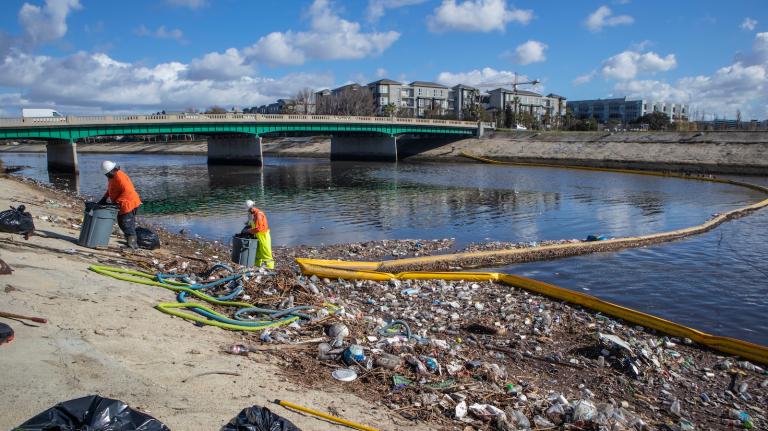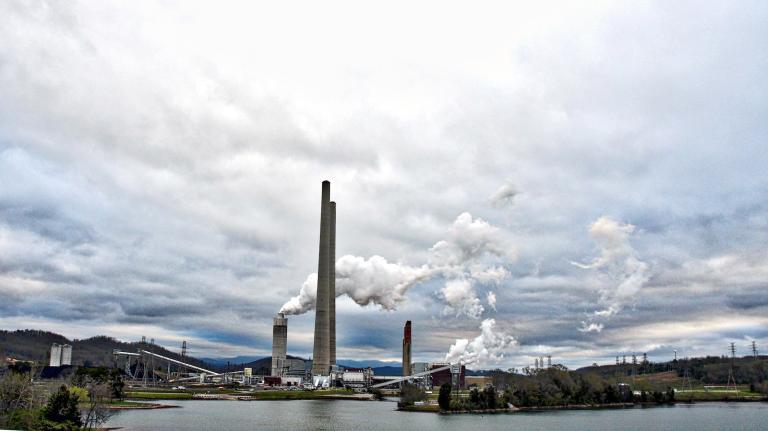A small town in North Carolina has taken a bold step, filing the first climate “deception” lawsuit against an electric utility in the United States.
In a civil lawsuit, the Town Council of Carrboro accuses Duke Energy, one of the largest power companies in the United States, of orchestrating a decades-long campaign of denialism and cover-up over the dangers of fossil fuel emissions. The lawsuit claims Duke’s actions stalled the transition to clean energy and exacerbated the climate crisis.
Over the past decade, similar suits have been filed by states and communities against large oil companies and — in at least one instance — a gas utility. But Carrboro, North Carolina, is the first municipality to ever file such a suit against an electric utility.
“We’re a very bold group,” Carrboro Mayor Barbara Foushee told Floodlight. “And we know how urgent this climate crisis is.”
Duke Energy said in a statement, “We are in the process of reviewing the complaint. Duke Energy is committed to its customers and communities and will continue working with policymakers and regulators to deliver reliable and increasingly clean energy while keeping rates as low as possible.”

Duke Energy
The suit, filed in Orange County, North Carolina, accuses Duke Energy of intentionally spreading false information about the negative effects of fossil fuels for decades, despite knowing since the late 1960s about planet-warming properties of carbon dioxide emissions. It claims the power company funded trade organizations and climate-denying scientists who created doubts about the greenhouse effect and obstructed policy and public action on climate change.
“Duke misled the public concerning the causes and consequences of climate change and thereby materially slowed the transition away from fossil fuels and toward renewable energy. Duke’s deception campaign served to protect its fossil fuel-based business model.” the lawsuit reads.
It accuses the power company, which in 2019 was the third-largest emitter of CO2 in the United States, of falsely marketing itself as a leader in clean energy while continuing to rely heavily on fossil fuels.
Between 2005 and 2023, the company reported reducing its CO2 emissions from electricity generation by 44 percent. But in 2023, at least 45 percent of the electricity Duke produced was still generated by burning coal or methane gas.
“[Duke] was one of the ringleaders behind deceiving the public and municipalities and governments about the causes and consequences of man-made climate change,” said Raleigh attorney Matthew Quinn, who is representing the town.
Carrboro is a town of about 20,000 with an annual budget of $81 million, Foushee said. Quinn, the attorney, estimates the town will incur some $60 million in costs in adapting to climate change impacts, including repairs to roads, upgrades to stormwater systems, and increased heating and cooling costs.

Town of Carrboro Facebook page
At a press conference Wednesday, Quinn explained that expert analysts had arrived at that number based on the amount and cost of climate adaptation that Carrboro would have undertaken had it not been for Duke’s alleged deception.
“There’s a major gulf between where we should be at and where we are right now,” Quinn said at the press conference.
“Really, what this case is about is that Carrboro has been a victim of the climate deception campaign by Duke Energy, (and) as a result of Duke’s conduct, Carrboro has suffered a lot of damages and injustice,” Quinn said in an interview.
Added Danny Nowell, Carrboro Mayor pro tem: “We have paid for it. We have paid for excess road repairs. We have faced the effects of stormwater, and we will continue to pay for other expenses as we uncover them. It’s time for Carrboro to be repaid.”
Quinn’s fees are being paid by NC Warn, a climate nonprofit, Foushee said.
“People that run local governments and others and people that run corporations, they all better get heavily serious about the climate crisis,” said Jim Warren, executive director of NC Warn. “It’s already harming so many across this state.”
Bob Jarvis, a law professor at Nova Southeastern University, called such lawsuits “cute.”
“And I use that term very, you know, intentionally. These lawsuits are cute in the sense that they’re trying to shame companies … into doing better,” said Jarvis, adding that they are rarely successful. “Companies have duties to their shareholders to maximize profits. And so what these lawsuits are really saying is that companies should be punished for maximizing profit.”
“It’s interesting with this as a case directly against a utility,” said Korey Silverman-Roati, a senior fellow at the Sabin Center for Climate Change Law. “It’s a shift in perspective from companies just producing fossil fuels to those burning it.”
Although this is the first climate deception lawsuit ever filed against an electric utility, it is not the first time that electric utilities have found themselves in legal trouble for the climate warming pollution their power plants spew as they burn fossil fuels to generate electricity.
In 2004, electric companies faced federal litigation brought by eight U.S. states, New York City, and several land trusts seeking to cap the companies’ CO2 emissions. The U.S. Supreme Court unanimously ruled against the plaintiffs.
Chase Pellegrini de Paur from Indy Week contributed to this story.





